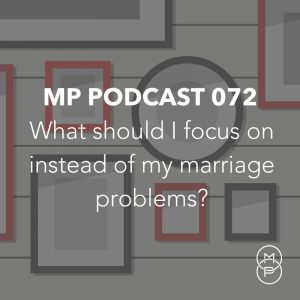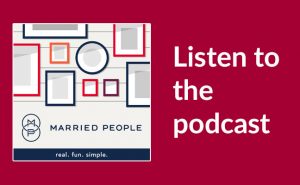 Links
Links
- Mike Foster’s website
- Fun Therapy podcast
- Five Dates book
- Extraordinary Couples online course
- Mike Foster on Twitter
- Mike Foster on Instagram
About Our Guest
We’re asking a slightly different question this week—what should I work on instead of my marriage problems? Because we all have marriage problems and it seems like we can get stuck on working those out instead of actually enjoying the time with our spouse.
For this discussion, we invited Mike Foster to the podcast. Mike is an author, speaker, and host of the Fun Therapy podcast. Through his books, workshops, and best-selling group curriculum, Mike teaches people how to crush shame and live each day as God’s beloved. Mike lives in San Diego, California with his wife, Jennifer.
Interview
Can you tell us a little about yourself?
I help individuals and couples build strong relationships. My wife and I published a book a year ago called Five Dates, which is a his and her guide to help couples create togetherness.
We also created a video series called Extraordinary Couples. We like to think of it as little protein bars for your relationship. Our whole strategy for couples and marriages is to be very simple, very action oriented and take micro steps toward change.
What made you go from the classic way to working on the more positive stuff?
There’s a lot of resources that say you have to work on your problems. The research shows that most successful couples have ongoing, chronic problems in their relationship. It’s OK to have problems and not to have a perfect marriage.
Both my wife and I were the victims of trying to work on our problems and we failed miserably. We realized even though we have problems in our relationship, we’d work to fix them and they’d only get worse.
Sometimes trying to work on problems can lead to even bigger problems. There are problems in relationships that need to be worked on, but usually they involve a third party. If you have big problems, get in to see a counselor.
We tend to see our spouse as the problem and spend a lot of time trying to fix that person. We’re big believers that ‘healthy people make healthy relationships’. My advice is usually to start working on your own heart.
I’ve realized I can’t change my wife—I’ve tried. Reorienting the energy we put away from the problems and the fixing and trying to get our spouse to change. Instead, let’s focus on our togetherness.
What are problems we need to let go of, and problems we need to take to counseling?
There are a few things that would certainly pop up right away—addiction, infidelity, anything where there’s strong breaks in trust. You’d certainly want to bring a third party in.
Also, the trending of the relationship in general—if you’re on a path that just keeps getting worse and worse and you see an outcome that’s not going to end well, I’d certainly reach out to a counselor.
Why did your problems get worse when you tried to work on them?
Years ago, Jennifer and I went to a marriage retreat. We were married seven or eight years at the time and had young kids. We’re not doing well and she comes up with an idea to go to a marriage retreat in the mountains. It was a complete disaster for us.
The speakers were well meaning, but as we sat in this retreat they talked about things that were so idealistic. We went to work on our marriage and I felt more frustrated, irritated, and angry. It led to one of the biggest fights of our marriage. I think we got connected to the wrong tool.
We want to create a lot of room and freedom to use the tools we create as they would benefit you in your context. When we talk about ‘dating,’ that could be a fancy dinner or it could be on your back porch. We always encourage couples to find the things that work for you and start small.
Why do you encourage couples to go to counseling?
For the past 15 years, I’ve been counseling people in all kinds of situations. Typically, the problems in our relationships stem from the problems in our own heart. We transfer our pain to our spouse instead of doing our own work. When I’m counseling couples, there’s a lot about the relationship, but there’s more about your personal work.
One of the things we talk about in Five Dates is family of origin. So many of the problems in our relationships has nothing to do with what’s going on today and so much to do with what happened in the family we grew up in. You have to have two healthy people in order to have a healthy relationship.
Why do people think the problem lies with their spouse?
Brene Brown says, “Blame is a quick way to discharge pain.” When I try to fix my wife, that’s a quick, easy solution for me to feel less pain in my life. The reality is, it’s easier for me to blame, point fingers and have an external focus for why I’m unhappy than doing the inner work.
Sometimes we talk about marriage as something we work on and that’s the narrative. But we forget that working on yourself is even more important than working on your marriage.
What happens when people take ownership of their own problems?
Unfortunately, there are a lot of stories are where people have not gotten it. The thing Jennifer and I love to see is when people have permission to know that it’s very normal stuff—having issues or conflict. The permission to start small. It brings us great joy to see couples engaging and trying. The worst thing you can do as a couple is to do nothing.
What is the difference between working on your problems and working on togetherness?
I could sit down with Jennifer and we could dive into a problem. That problem could be not clearly defined or there’s layers to that problem that both of us are confused by and not even qualified to deal with the real truth.
Working on togetherness is developing a rhythm where you hug your spouse three times a day for twenty to thirty seconds. Physiologically, your body will start releasing hormones and chemicals into your body at about the twenty second spot where you will feel more connecting and loving toward your spouse. That is a perfect example of a togetherness strategy.
We could talk about problems or we could talk about things we’re grateful for. Both involve words, both involve talking, both involve sitting down and making time for this conversation. But which conversation would you rather have?
Why aren’t couples usually qualified to talk about their problems?
Part of the couple’s problem is they have static energy. There’s no momentum in the relationship. Then they use the energy they have to work on a problem, which sends them backwards instead of hugging, having gratitude, going on dates, or other small things. That’s going to create momentum and positive energy in a relationship.
One of the things we saw is we had several couples in our friendship group who raised their kids, sent them off to college, and after twenty plus years they get a divorce. They put the marriage on hold for 18 or 19 years while they raised kids and then tried to pick it back up.
I encourage couples to start small—my wife and I will grab a Starbucks for thirty minutes during a busy week to spend a few minutes together.
Show Closing
If you want more from Mike Foster, you can find his Five Dates at fivedates.co, his guided video series at extraordinarycouples.net or his website mikefoster.tv.
Thanks for joining us for the Married People Podcast. We hope you’ll subscribe to the podcast on iTunes and leave a review – they help us make the podcast better.
We want to hear from you! Share with us on Facebook, Instagram or our site. If you want more resources, check out the Married People membership or Ted’s book Your Best Us.





